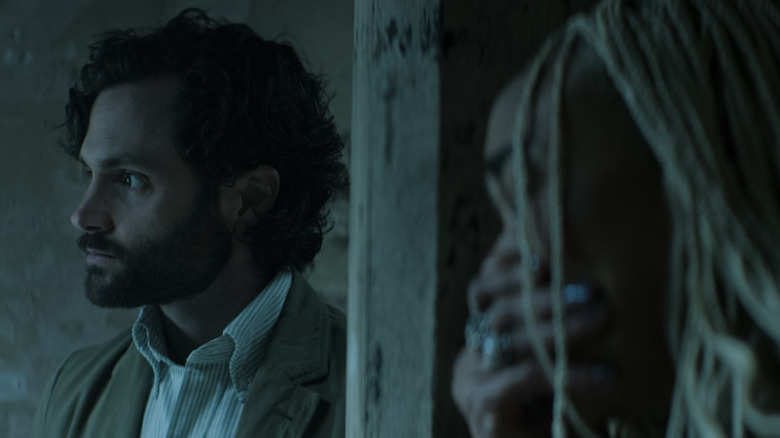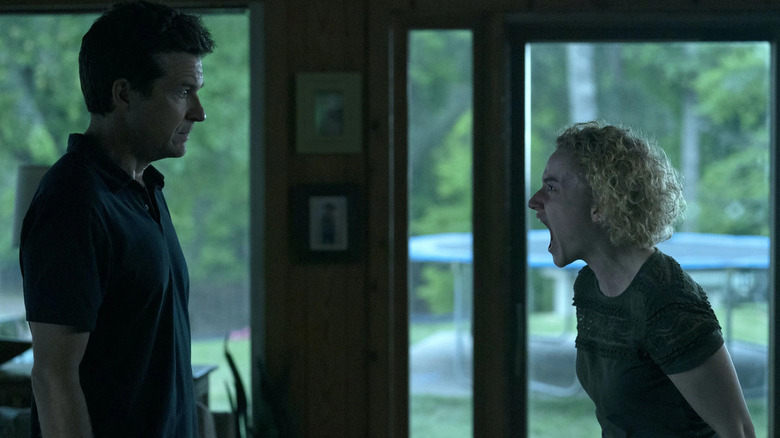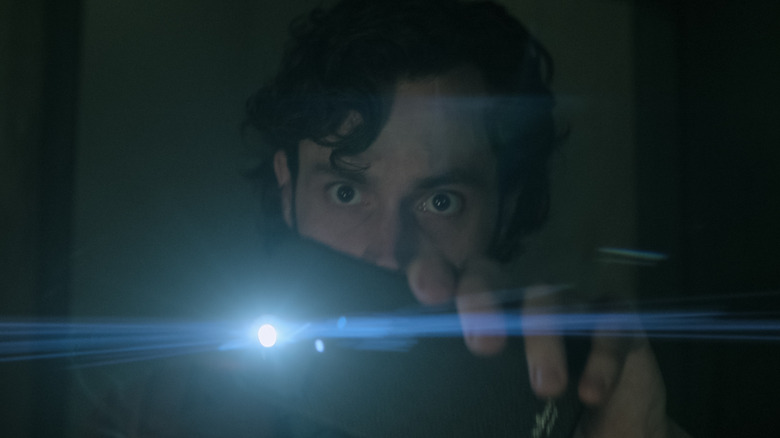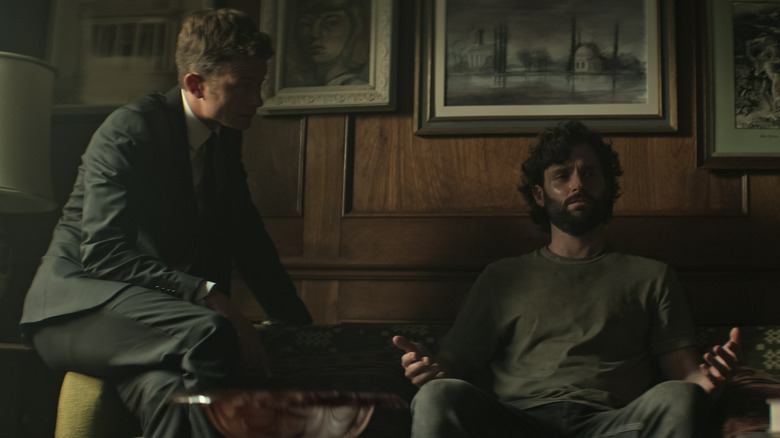You Season 4 Is The Perfect Example Of A Split-Season Release Done Right
Netflix wants what HBO has. Sort of.
HBO has long dominated our Sunday nights with appointment TV, making sure we all watch and rave about the same thing because we're all in the same place at the same time. It began 24 years ago with "The Sopranos," and has held strong ever since. These past few months are the perfect example of how the network capitalizes on the cultural zeitgeist, with one hit show after another: from "House of the Dragon" to "The White Lotus" to "The Last of Us" to the upcoming season of "Succession," there's always something worth gushing about (aka a consistent reason to keep subscribing to HBO Max).
Netflix has always been a different beast entirely. This is the company that pioneered the streaming industry by introducing viewers to the binge model and overwhelming them with a constant deluge of options. And the binge model has always been fun — who doesn't want to blaze through a season of TV in a single weekend? Starting something on Friday and waiting by the (increasingly metaphorical) water cooler to discuss it on Monday has become routine. But there's a reason that Netflix has been drifting away from its longtime strategy.
The binge model doesn't exactly maximize viewership. Unless every series rides the word-of-mouth wave to relevance (like "Squid Game"), then any given season lives a pretty short lifespan; it's watched and forgotten in basically the same breath. The week of release is its best shot. And if you miss the high of the momentary hype, maybe you forget to catch up at all. Knowing all of this has given Netflix the license to experiment with its release strategies (often to mixed results). But the way the streamer pulls off the fourth season of "You" might mean they've finally cracked the case.
The case for the split-season release
In the spirit of how TV traditionally works, Netflix has previously considered releasing episodes weekly, but even floating that plan tends to inspire a backlash. That's just not how people are used to interacting with Netflix, and the change throws them off. So instead, the streamer has made a habit of splitting shows into parts and staggering the release. That way, both the binge and the appointment TV strategies work in tandem.
Splitting a show like "You" into pieces — five episodes one month and five episodes the next — makes it easier to blaze through in a single night. It's a bite-sized binge that gives the audience enough to sink their teeth into, without becoming hard to finish. Plus, knowing there's more to come leaves people chatting, wondering, and speculating for a good few weeks until there's more.
They've been doing this for a while now, with shows like "Lucifer" and "Stranger Things." Although the latter had more to do with last-minute effects work than strategy, the impact was the same: "Stranger Things" commanded our attention for a lot longer than usual. So why not keep this up, especially when it comes to popular titles with built-in fanbases?
Well, maybe because splitting a season into parts isn't always for the best. Where it gets really annoying is in a situation like "Ozark": though the final season was split in a way that ends part 1 on a massive cliffhanger, it made the season overall feel disjointed. Seven episodes were spent building momentum and when part 2 rolled around, it dropped the ball, letting all of that well-earned tension dissipate. The problem with all of Netflix's other staggered releases is that they feel like seasons chopped into pieces. But for "You," this structure was meant to be.
Two (killers) for the price of one
The rest of this post contains spoilers for "You Season 4 — Part 2."
Whether or not the latest season of "You" was made with the knowledge that it would be released in two parts, it certainly feels that way because each piece is its own thing: part 1 is a whodunit and part 2 is a thrilling character study.
Disturbed romantic Joe Goldberg (Penn Badgley) has basically wandered into a completely different show when we catch up with him in season 4. He's living in a "Knives Out" knockoff, where he's surrounded by irritating wealthy elites, and trying to hunt down the serial killer who's slowly picking them off. It's an Agatha Christie novel, where the detective is also a murderer! By the end of the first five episodes that comprise part 1, Joe cracks the case. He finds the killer and sets a new goal: to take out Rhys Montrose (Ed Speleers), the psycho-politician, and Eat The Rich Killer who is ruining his life.
Part 1 ends with the exciting prospect that in the next five episodes, Joe will confront and (against his will) befriend a serial killer. But then part 2 rolls around with a jaw-dropping reveal: there wasn't another killer, after all. Joe, having reached new levels of f****ed up, has split his personality in half. Rhys as we know him was merely a figment of Joe's imagination.
Two parts of a whole
If you're anything like me, then you spent most of the eighth episode reeling from this rug-pull. In retrospect, of course Rhys wasn't real: nobody else ever spoke to him! And of course, Joe didn't let Marienne go. It's Joe. But all of those hints were hidden in plain sight so "You" would have the space to tell 2 separate stories.
Part 1 paints the portrait of a changed man: Joe is in a new country, with a new identity, nursing a broken heart after being rejected by Marienne. But unlike all his other rejections, he (apparently) let her go and has since kept his distance, trying to move on and become a better person. That's derailed by the whole serial killer situation, but we still see Joe spend five episodes trying to "do the right thing." Hoping to save both himself and the Oxford Circle (for Kate's sake), he hunts down the killer. Plus, in that five-episode stretch, he only kills one person! (RIP Vic, but one body is a real improvement for Joe).
But then the Agatha Christie homage comes to an end, and we revert back to something that takes inspiration from one of Joe's favorites: Edgar Allen Poe. Joe has been the killer all along, and now he must accept the earth-shattering reality that he hasn't changed at all.
Instead of feeling disrupted, both parts of the seasons have their own mini-arcs for our favorite anti-hero — including lots of tense buildups, explosive reveals, and a satisfying climax. The split works seamlessly with the story itself and in fact, makes the action much more riveting than it may have felt during a 10-hour binge. If "You" teaches us anything, it's that with the right story, this split-season method can be so much more than a clunky release strategy.



